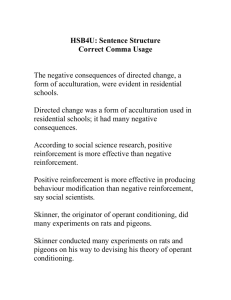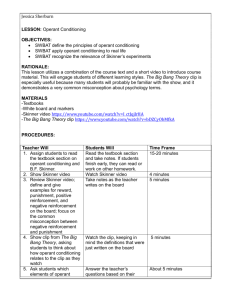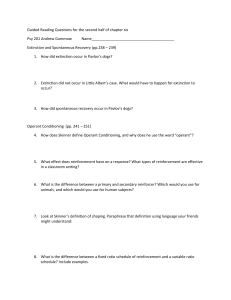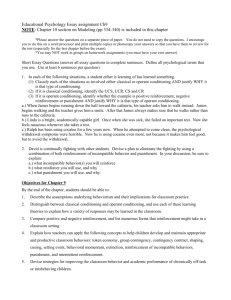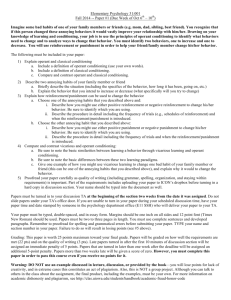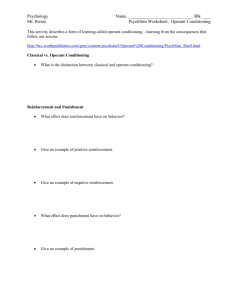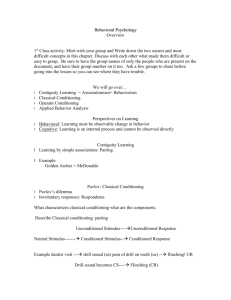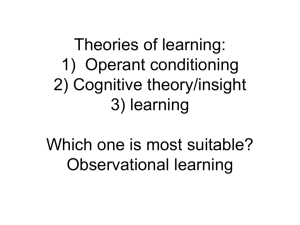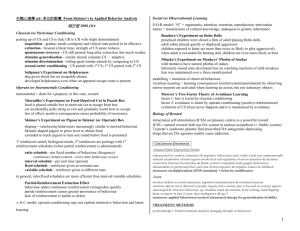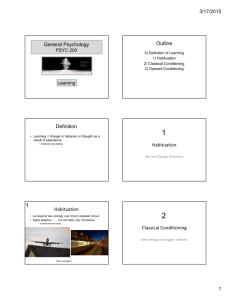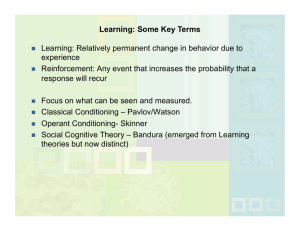Operant Conditioning
advertisement
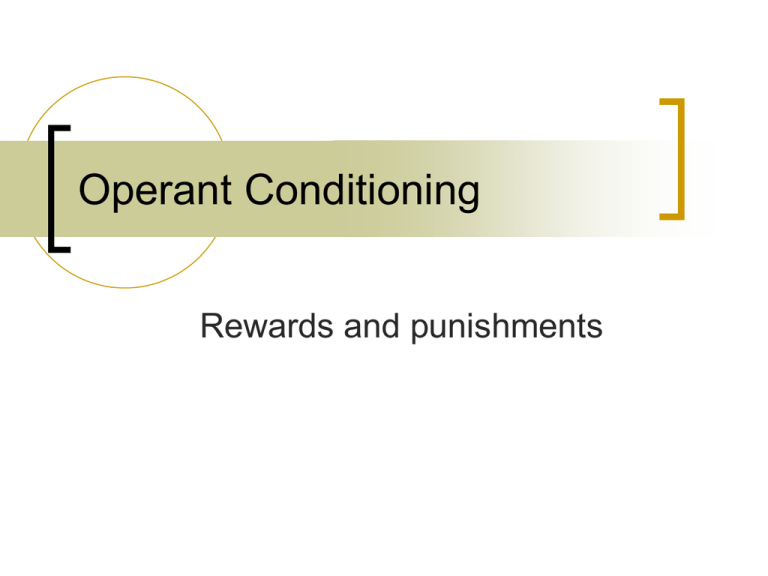
Operant Conditioning Rewards and punishments Classical vs. Operant Conditioning Classical Conditioning Behavior is determined by what PRECEDES it. Operant Conditioning Behavior is determined by anticipation of what FOLLOWS it. Involuntary Voluntary Dog salivates after a tone. Dog sits in anticipation of getting a treat. Classical or Operant? Alice leaves her clothes and toys all over her room. It seems that the only time she cleans up her room is when her mother yells at her. When she yells at her, Alice picks up her clothes and put away her toys. Operant Study: Skinner Box! A very bright (mildly painful) light is turned on a rat. The rat has learned that he can turn off the light by pressing a lever on the other side of his cage. As soon as the light comes on, the rat runs across the room and presses the lever. Operant Conditioning Positive Reinforcement: give you something you like or want in order to make a behavior more likely (+) (most like a reward) If you work quietly for an hour, I’ll let you listen to your Ipod at the end of class. (+) Negative Reinforcement: taking away something you don’t like in order to make a behavior more likely (-) I won’t make you do your chores IF you come to your grandmother’s this weekend. Operant Conditioning Omission: Removing a thing you like in order to make a behavior less likely. Taking away your cell phone to decrease the times you come back late from curfew. Punishments: add something you don’t like in order to make a behavior less likely. I’ll smack you across the face if you don’t stop talking in class. Mistakes Teachers/Parents Make Paying attention to students/kids’ bad behavior (positive reinforcement, which increases behaviors) Not paying attention to good behavior (actually, a form of punishment… DOESN’T WORK!) Suspending students…why does this almost never work? (is it omission? Punishment?) Trying to use omission (cell phone, groundings) as punishment (why does a kid see this as punishment?) Problems with Punishment it models aggression as a way to solve problems, which is ineffective in “the real world” breeds anger in the recipient/towards the punisher doesn’t teach an alternative behavior. the behavior only goes away when the punisher is around. “There is unanimous accord among experts that harsh punishment is detrimental for children.” Reinforcement Schedules fixed ratio – set number (every three responses you give, you get a chocolate) variable ratio – unpredictable number of responses (slot machine payouts, not knowing what assignments will be graded) fixed interval – set amount of time (pay you every hour you work) variable interval – unpredictable amount of time (getting messages on Facebook/text) Reinforcement Schedule? You try… Sarah is paid on a commission basis. She gets a bonus for every 3rd sale. Juan's teacher gives him a gold star for every book he reads. Martha is fly fishing. She casts her line and a fish is caught 5 times throughout the day, at unpredictable times. When it rains, you use an umbrella, which keeps your dry. Reinforcement Schedules: Effectiveness Variable schedules are more resistant to extinction Continuous reinforcement causes the fastest learning. Immediate reinforcement is more effective than delayed. If reinforcement doesn’t follow the response, the behavior might become extinct. If you study and don’t get A’s like you thought…you might stop studying. Skinner’s Method of Learning In Skinner's book The Technology of Teaching, he said there are five main obstacles in learning: People have a fear of failure. The task is not broken down into small enough steps. There is a lack of directions. There is also a lack of clarity in the directions. Positive reinforcement is lacking. Skinner suggests that any age-appropriate skill can be taught using five principles to remedy the above problems Give the learner immediate feedback. Break down the task into small steps. Repeat the directions as many times as possible. Work from the most simple to the most complex tasks. Give positive reinforcement. Overjustification Effect Overjustification effect: when we are rewarded for behaviors that we naturally enjoy, we sometimes lose our intrinsic motivation. Learning and grades? Professional athletes? Criticisms of Behavioralism Deemphasizes the role of internal thoughts and feelings in behavior; Presents humans as lacking free will Ignores biological predispositions Support for Criticisms Experiments with humans and animals both indicate that biological predispositions influence conditioning. a. Animal training b. Human societies built on behavioralist principles. Support for Criticisms 2. Expectations alter the effectiveness of conditioning (i.e., alcoholics and nauseaproducing drug; overjustification effect). 3. Learning occurs in the absence of rewards or punishments (this is called latent learning) - mice and cognitive maps Observational Learning “Modeling” Observational Learning Also known as modeling. Albert Bandura – Bobo doll experiment Modeling Prosocial Behavior – constructive behavior Antisocial Behavior – unproductive or destruction behavior

